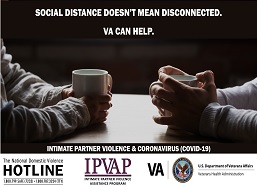Intimate Partner Violence (IPV) & COVID-19
COVID-19 Booster Shots
Start your new year with a boost. Schedule your COVID-19 booster from your local VA today and get a boost of hope, health and safety for the new year. To learn more about boosters and vaccines available at VA, visit: COVID-19 booster shots and additional dosesIntimate Partner Violence & COVID-19

During a public crisis (such as, the COVID-19 pandemic) which disrupts daily life, it is important to recognize and support those who are experiencing or using intimate partner violence (IPV). For individuals experiencing IPV, any disruption to normal life or access to services can mean increased potential for harm. This often occurs during natural disasters or human-based disasters, such as fires, chemical spills, and mass violence. Special considerations to support the experience of violence during disasters include ensuring continued access to resources, support, and services. Those who use violence may experience increased stress during a disaster as a result of many factors, such as reduced access to basic needs, food, water, or shelter. Seeking assistance in hospitals, court houses and other public service agencies may also be limited. The VA Intimate Partner Violence Assistance Program (IPVAP) has Coordinators in VA facilities available for support.
COVID-19 and Intimate Partner Violence (IPV) - Video
Research has shown relationship conflict and/or abuse may occur and escalate during times of crisis (like the spread of the coronavirus, COVID-19). In response to COVID-19 and its impact on IPV, the VA Intimate Partner Violence Assistance Program (IPVAP) released a campaign to address the unique circumstances faced by those who are at heightened risk due to IPV.
The “COVID-19 and Intimate Partner Violence (IPV)” informational video was developed as an additional modality to raise awareness & broaden outreach. Because COVID-19 and IPV can affect anyone, special attention was paid to inclusivity with regard to diversity (race, sexuality, age, gender.)
Learn more about VA IPVAP and Other VA Services:
- Nationwide VA IPVAP Coordinator Roster
- Veterans Crisis Line
- National Center for PTSD Resources for Managing Stress
- Women’s Veteran Healthcare Website
IPVAP Produced Resources:
- Intimate Partner Violence & Novel Coronavirus Disease (COVID-19) Response: VA Staff Fact Sheet (PDF)
- Staying Safe During COVID-19: Patient Fact Sheet (PDF)
News articles for Awareness (not VA publications):
- “Home Is Not A Safe Place For Everyone” *
- “Trapped at home: Coronavirus could be disastrous for domestic violence victims” *
- “If You Are Locked Down with Someone Who May Become Violent" *
- “Who’s most at risk for COVID-19? It’s probably not you” *
- “As Cities Around the World Go on Lockdown, Victims of DV Look For A Way Out” *
Disaster Specific Resources: Coronavirus (COVID-19)
- National Domestic Violence Hotline *
- NNNEDV Resources for Coronavirus *
- Futures Without Violence Information on Coronavirus *
- National Resource Center on Domestic Violence, Response in Times of Disaster *
- DV and Natural Disasters Curriculum, NNEDV Economic Justice Summit, 2018 *
- National Coalition Against Domestic Violence *
- myPlan App: Safety Planning Application *
Building Healthy Relationships:
Explore IPVAP) Resources
For more information or assistance, contact your local Intimate Partner Violence Assistance Program Coordinator, Primary Care Social Worker or other Provider. Women Veterans can also ask for the Women Veterans Program Manager.
Not yet a patient at VA? - Apply Now
Find help in the community by calling the National Domestic Violence Hotline at 1−800−799−7233 (SAFE) or TTY 1−800−787−3224.
* Links with an asterisk (*) next to them will take you outside the VA website. VA is not responsible for the content of the linked site. This link does not constitute endorsement of the non-VA website or its sponsor.























